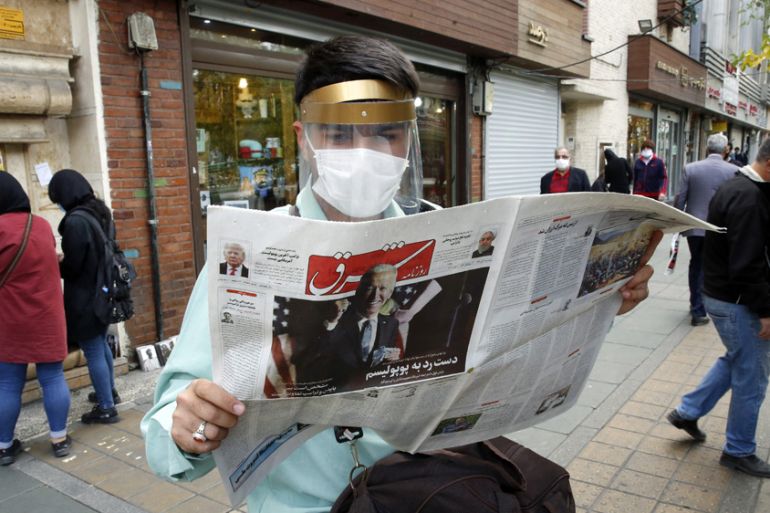Iran nuclear deal participants hold virtual talks amid tensions
The remaining parties to the 2015 Iran nuclear deal hold a virtual meeting in the wake of further breaches of the accord’s limits by Tehran and high tension in the region.

Senior diplomats from Iran and major powers have met online to discuss the state of a nuclear deal that is eroding despite conciliatory signals from United States President-elect Joe Biden.
The Joint Comprehensive Plan of Action (JCP0A), commonly known as the Iran nuclear deal, was agreed upon in Vienna on July 14, 2015, between Iran and the five permanent members of the United Nations Security Council – China, France, Russia, the UK and US – plus Germany, together with the European Union.
Keep reading
list of 4 itemsBiden: Iran nuclear deal best way to avoid Middle East arms race
US must consult Gulf states on reviving Iran nuclear deal: Riyadh
Iran’s Rouhani: No conditions or negotiations on nuclear deal
But on May 8, 2018, US President Donald Trump unilaterally pulled out of the landmark pact and revived punishing sanctions as part of a “maximum pressure campaign” against Iran. One year later, Iran started abandoning key provisions of the JCPOA.
Chaired by senior EU foreign affairs official Helga Schmid, the meeting on Wednesday of the so-called “joint commission” included the remaining signatories to the pact and was meant to prepare upcoming talks among their foreign ministers.
In the wake of the US withdrawal, Iran has retaliated by progressively abandoning limits on its nuclear activity laid down in the JCPOA, most recently planning to install advanced centrifuges at Iran’s main nuclear enrichment plant in Natanz. Last week France, Germany and Britain – collectively known as the “E3” – condemned the “deeply worrying” plan as being contrary to the nuclear deal.
Soured relations
Meanwhile, the assassination last month of prominent Iranian nuclear scientist Mohsen Fakhrizadeh has heightened tensions in the region, with Iran blaming the killing on Israel.
After Fakhrizadeh’s kills, MPs in Iran’s hardline Parliament passed a bill calling for further expansion to Iran’s nuclear programme and an end to inspections of nuclear facilities by the UN watchdog International Atomic Energy Agency (IAEA).
“The government of the Islamic Republic of Iran is committed and obligated to implement legislation approved by the parliament after they have undergone legal processes,” Iran’s deputy foreign minister Abbas Araghchi, who represented Iran in the joint commission, said after the meeting according to a statement by the foreign ministry.
Iran’s execution of dissident journalist Ruhollah Zam on Saturday has further soured the diplomatic atmosphere.
“Instead of condemning the cowardly assassination of Iran’s prominent nuclear scientist, the three European governments condemned the legal punishment of a guilty individual,” said Araghchi.
Meanwhile, the Russian delegate to the JCPOA, Mikhail Ulyanov, tweeted after the meeting that “the participants confirmed their firm commitment to the nuclear deal, as well as readiness to undertake intensive diplomatic efforts to ensure its full implementation.”
German Foreign Ministry spokeswoman Maria Adebahr had earlier said the meeting would assess the implementation of the nuclear accord, and that the European countries would demand Iran return to full compliance.
Biden has said he hopes to return the US to the deal, which was negotiated while he was vice president, but has revealed little else about forthcoming US strategy on the question.
Earlier this month, Iranian President Rouhani said the nuclear deal could be restored without negotiations. “The next person [Biden] can put up a nice piece of paper and sign it and it just needs a signature, we’ll be back where we were. It takes no time and needs no negotiations,” the president, of Iran’s moderate-reformist camp, said in a televised cabinet speech on December 9.
“And it’s not just about the US. The P4+1 can return to all their commitments and we will do the same,” Rouhani added, in reference to France, Germany, the UK, China, and Russia.
Iran seeking actions, not words
The JCPOA promises Iran economic incentives in exchange for curbs on its nuclear programme, but with the reinstatement of US sanctions, the other nations have been struggling to provide Iran the assistance it seeks.
Commenting on speculation over a return to the nuclear deal, Araghchi said Iran recognises actions, not words.
“Iran has always expressed its stance transparently and is ready to restart its JCPOA commitments that were halted based on sections 26 and 36 of the JCPOA after the US returns to its commitments and returns conditions to how they were in January 2017,” he said.
Araghchi said Europe always expects Iran to show restraint when faced with “illegal and hostile” acts from the US and others.
“But Iran cannot pay the full price of implementing the JCPOA and accept others’ illegal behaviours,” he said. “Others must also pay a price to maintain the JCPOA”.
Despite Iran’s violations, the IAEA has reported that Tehran continues to give inspectors full access to its nuclear sites, a key reason the JCPOA member nations say it is worth preserving.
Also on Wednesday, Iran’s Supreme Leader Ayatollah Ali Khamenei warned Iranians not to “trust the enemy”, saying: “Enmities are not limited to Trump’s America and will not end just because he has left office.”